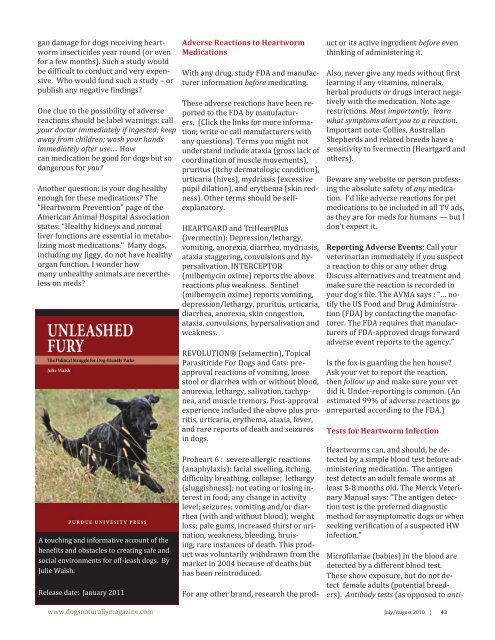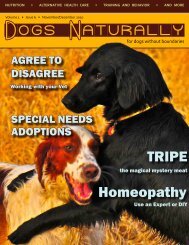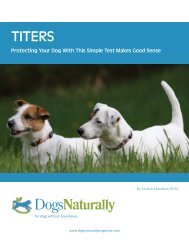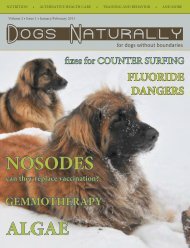July/August 2010 - Dogs Naturally Magazine
July/August 2010 - Dogs Naturally Magazine
July/August 2010 - Dogs Naturally Magazine
Create successful ePaper yourself
Turn your PDF publications into a flip-book with our unique Google optimized e-Paper software.
gan damage for dogs receiving heartworm<br />
insecticides year round (or even<br />
for a few months). Such a study would<br />
be difficult to conduct and very expensive.<br />
Who would fund such a study – or<br />
publish any negative findings?<br />
One clue to the possibility of adverse<br />
reactions should be label warnings: call<br />
your doctor immediately if ingested; keep<br />
away from children; wash your hands<br />
immediately after use…. How<br />
can medication be good for dogs but so<br />
dangerous for you?<br />
Another question: is your dog healthy<br />
enough for these medications? The<br />
“Heartworm Prevention” page of the<br />
American Animal Hospital Association<br />
states: “Healthy kidneys and normal<br />
liver functions are essential in metabolizing<br />
most medications.” Many dogs,<br />
including my Jiggy, do not have healthy<br />
organ function. I wonder how<br />
many unhealthy animals are nevertheless<br />
on meds?<br />
A touching and informative account of the<br />
benefits and obstacles to creating safe and<br />
social environments for off-leash dogs. By<br />
Julie Walsh.<br />
Release date: January 2011<br />
Adverse Reactions to Heartworm<br />
Medications<br />
With any drug, study FDA and manufacturer<br />
information before medicating.<br />
These adverse reactions have been reported<br />
to the FDA by manufacturers.<br />
(Click the links for more information;<br />
write or call manufacturers with<br />
any questions). Terms you might not<br />
understand include ataxia (gross lack of<br />
coordination of muscle movements),<br />
pruritus (itchy dermatologic condition),<br />
urticaria (hives), mydriasis (excessive<br />
pupil dilation), and erythema (skin redness).<br />
Other terms should be selfexplanatory.<br />
HEARTGARD and TriHeartPlus<br />
(ivermectin): Depression/lethargy,<br />
vomiting, anorexia, diarrhea, mydriasis,<br />
ataxia staggering, convulsions and hypersalivation.<br />
INTERCEPTOR<br />
(milbemycin oxime) reports the above<br />
reactions plus weakness. Sentinel<br />
(milbemycin oxime) reports vomiting,<br />
depression/lethargy, pruritus, urticaria,<br />
diarrhea, anorexia, skin congestion,<br />
ataxia, convulsions, hypersalivation and<br />
weakness.<br />
REVOLUTION® (selamectin), Topical<br />
Parasiticide For <strong>Dogs</strong> and Cats: preapproval<br />
reactions of vomiting, loose<br />
stool or diarrhea with or without blood,<br />
anorexia, lethargy, salivation, tachypnea,<br />
and muscle tremors. Post-approval<br />
experience included the above plus pruritis,<br />
urticaria, erythema, ataxia, fever,<br />
and rare reports of death and seizures<br />
in dogs.<br />
Proheart 6 : severe allergic reactions<br />
(anaphylaxis): facial swelling, itching,<br />
difficulty breathing, collapse; lethargy<br />
(sluggishness); not eating or losing interest<br />
in food; any change in activity<br />
level; seizures; vomiting and/or diarrhea<br />
(with and without blood); weight<br />
loss; pale gums, increased thirst or urination,<br />
weakness, bleeding, bruising;<br />
rare instances of death. This product<br />
was voluntarily withdrawn from the<br />
market in 2004 because of deaths but<br />
has been reintroduced.<br />
For any other brand, research the prod-<br />
uct or its active ingredient before even<br />
thinking of administering it.<br />
Also, never give any meds without first<br />
learning if any vitamins, minerals,<br />
herbal products or drugs interact negatively<br />
with the medication. Note age<br />
restrictions. Most importantly, learn<br />
what symptoms alert you to a reaction.<br />
Important note: Collies, Australian<br />
Shepherds and related breeds have a<br />
sensitivity to Ivermectin (Heartgard and<br />
others).<br />
Beware any website or person professing<br />
the absolute safety of any medication.<br />
I’d like adverse reactions for pet<br />
medications to be included in all TV ads,<br />
as they are for meds for humans — but I<br />
don’t expect it.<br />
Reporting Adverse Events: Call your<br />
veterinarian immediately if you suspect<br />
a reaction to this or any other drug.<br />
Discuss alternatives and treatment and<br />
make sure the reaction is recorded in<br />
your dog’s file. The AVMA says : “… notify<br />
the US Food and Drug Administration<br />
(FDA) by contacting the manufacturer.<br />
The FDA requires that manufacturers<br />
of FDA-approved drugs forward<br />
adverse event reports to the agency.”<br />
Is the fox is guarding the hen house?<br />
Ask your vet to report the reaction,<br />
then follow up and make sure your vet<br />
did it. Under-reporting is common. (An<br />
estimated 99% of adverse reactions go<br />
unreported according to the FDA.)<br />
Tests for Heartworm Infection<br />
Heartworms can, and should, be detected<br />
by a simple blood test before administering<br />
medication. The antigen<br />
test detects an adult female worms at<br />
least 5-8 months old. The Merck Veterinary<br />
Manual says: “The antigen detection<br />
test is the preferred diagnostic<br />
method for asymptomatic dogs or when<br />
seeking verification of a suspected HW<br />
infection.”<br />
Microfilariae (babies) in the blood are<br />
detected by a different blood test.<br />
These show exposure, but do not detect<br />
female adults (potential breeders).<br />
Antibody tests (as opposed to anti-<br />
www.dogsnaturallymagazine.com <strong>July</strong>/<strong>August</strong> <strong>2010</strong> | 43












